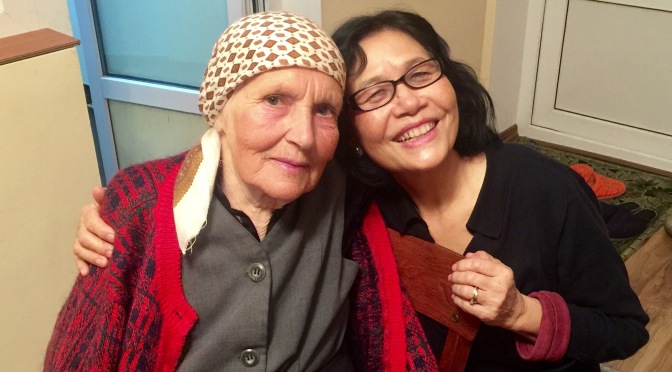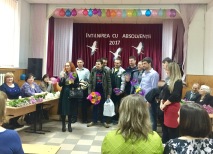For a hard rock trio, you need a guitar, a bass and drums. For a string quartet: two violins, a viola and a cello. But for traditional music here in Moldova, get an accordion, a cobza, a nai and a tobă, as well as some people with great voices. You know what an accordion is. A cobza is a Moldovan lute, with eight strings. A nai is a pan flute, similar to those played in Bolivia. A tobă is a traditional drum.
The musicians you see here play these instruments. They come from Constești, the village where Champa lived during her pre-service training. The lead singer, shown in the larger photo, is Tudor Grigoriţă, a colleague and friend of mine at the Consiliul Raional in Ialoveni. He organizes cultural activities for the entire county, or raion, of which Costești is a part. I usually see him wearing a suit, so it’s fun to watch him perform. That’s him in the video interacting with the nai, or flute, player, who is the music teacher in Costești.
Costești is near Ialoveni, where Champa and I live now. On Saturday, we traveled there to visit Champa’s host family and to meet Mary Pendleton, the first American ambassador to Moldova, from 1992-1995, after Moldova gained its independence from the former Soviet Union.

We expected an informal gathering where Amb. Pendleton, now retired, would share some memories. Since she was a Peace Corps volunteer herself in Tunisia earlier in her career, she also wanted to meet some current volunteers. The mayor of Costești, Natalia Petrea, surprised us with a much grander event — a delicious meal at a beautiful local resort, with entertainment provided by this reknown local musical group. That’s the mayor, or primara, in the purple dress, next to the former ambassador, in pink.
Moldova, which shares many of its musical traditions with Romania, has other instruments, too, such as the bucium (a long alphorn), the kaval (an end-blown flute) and the cimbalom (a kind of dulcimer). But as you can see and hear for yourself, the ones shown here are quite enough to produce beautiful music together.







 What have you wondered about what Champa and I are doing in the Peace Corps? What questions do you have about Moldova, our service, our fellow volunteers, etc., or about what it’s been like for us to walk away from our American lives to do something so different? Ask us — either with a comment here or in a private message (djarmul@gmail.com). We’ll try to answer your questions in an upcoming post!
What have you wondered about what Champa and I are doing in the Peace Corps? What questions do you have about Moldova, our service, our fellow volunteers, etc., or about what it’s been like for us to walk away from our American lives to do something so different? Ask us — either with a comment here or in a private message (djarmul@gmail.com). We’ll try to answer your questions in an upcoming post!




 The two older students in the second photo enjoyed the books, too. The box included everything from illustrated children’s books to short story collections.
The two older students in the second photo enjoyed the books, too. The box included everything from illustrated children’s books to short story collections. The school got them all for free. Champa requested them from
The school got them all for free. Champa requested them from  They also send free books elsewhere in the developing world, and to libraries, prisons, hospitals and Native American and Appalachian groups in the United States.
They also send free books elsewhere in the developing world, and to libraries, prisons, hospitals and Native American and Appalachian groups in the United States.




 In the middle photo on top is Donna Barnes, formerly a professor at Howard University, who called her school director, Eudochia Babalici, a Super Moldovan for working “so long, with so little. She is a true inspiration to me.”
In the middle photo on top is Donna Barnes, formerly a professor at Howard University, who called her school director, Eudochia Babalici, a Super Moldovan for working “so long, with so little. She is a true inspiration to me.”



 attention not only for volunteers but also for the great work being done by some of our Moldovan partners. Liuba manages communications for Peace Corps Moldova and, at Tracey’s request, I recently began working with her and others on communications projects, drawing on my own background in the field.
attention not only for volunteers but also for the great work being done by some of our Moldovan partners. Liuba manages communications for Peace Corps Moldova and, at Tracey’s request, I recently began working with her and others on communications projects, drawing on my own background in the field.
 Five other members of my Peace Corps group also call North Carolina home. As you can see in the top photo, we hail from Asheville, Boone, Charlotte, Winston-Salem, Durham and Raleigh. From the left, we’re Tim Crowley, Alex Bostian, Tom Harvey, Reggie Gravely, myself, Champa and Jim Fletcher. The six of us are now working as volunteers across Moldova.
Five other members of my Peace Corps group also call North Carolina home. As you can see in the top photo, we hail from Asheville, Boone, Charlotte, Winston-Salem, Durham and Raleigh. From the left, we’re Tim Crowley, Alex Bostian, Tom Harvey, Reggie Gravely, myself, Champa and Jim Fletcher. The six of us are now working as volunteers across Moldova.
 providing training in anti-terrorism, cyber defense, emergency medicine and other areas. In 1999, North Carolina established an official partnership with Moldova, which now includes the efforts of numerous private firms, civic organizations and nonprofit agencies. Secretary of State Elaine Marshall, who
providing training in anti-terrorism, cyber defense, emergency medicine and other areas. In 1999, North Carolina established an official partnership with Moldova, which now includes the efforts of numerous private firms, civic organizations and nonprofit agencies. Secretary of State Elaine Marshall, who 
 Our ranks also include Mark Gilchrist, left, a volunteer in the group ahead of us.
Our ranks also include Mark Gilchrist, left, a volunteer in the group ahead of us. 





